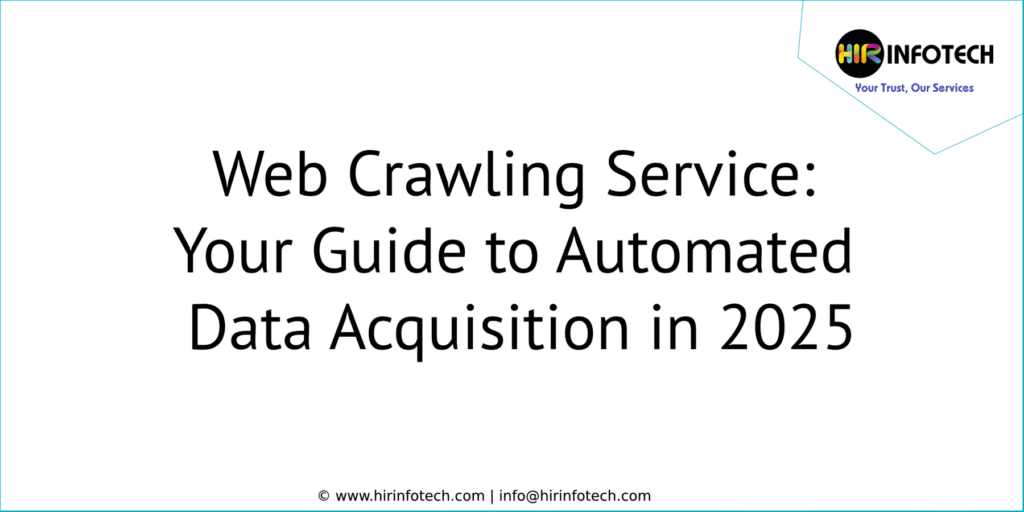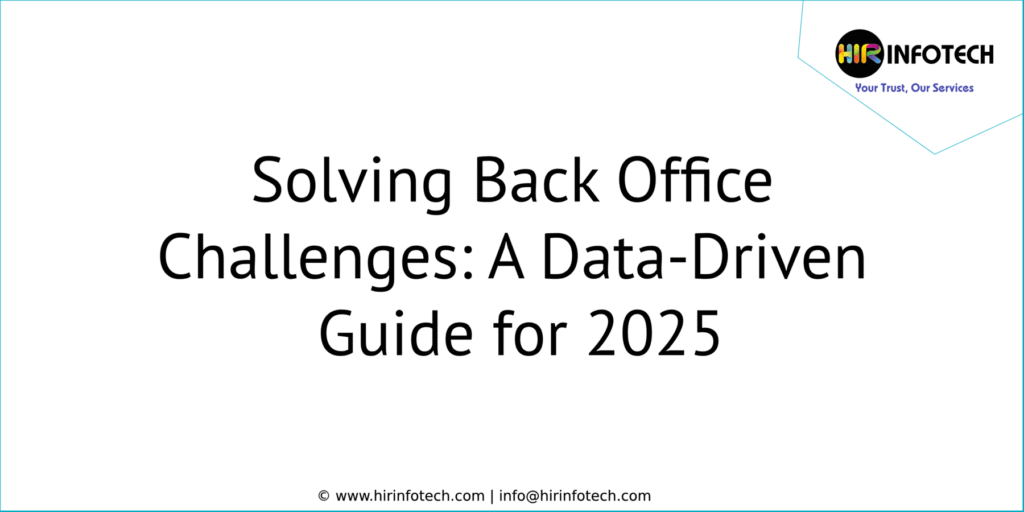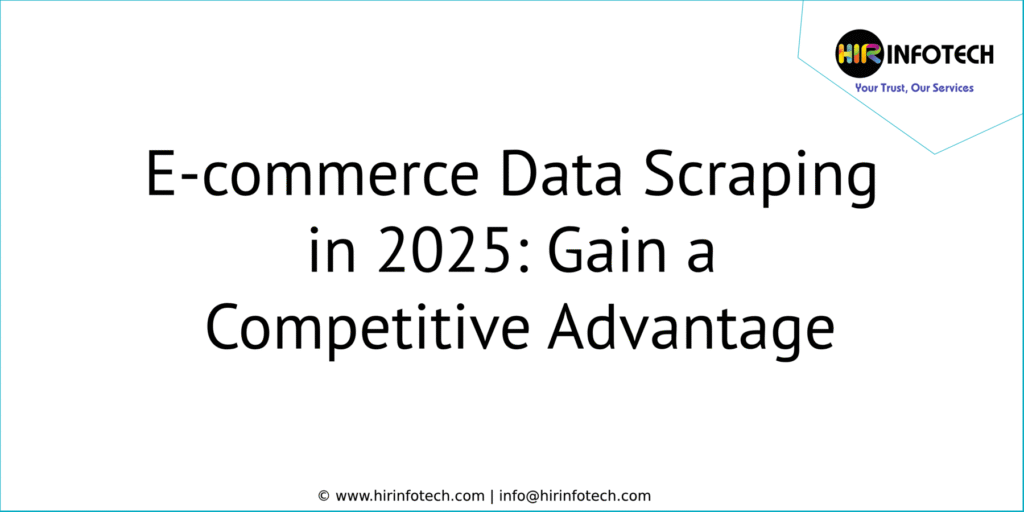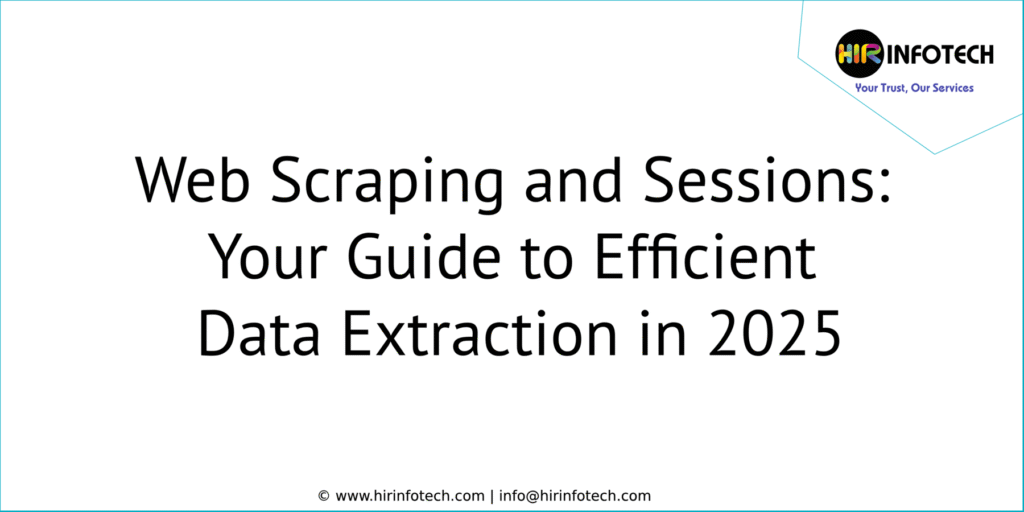
Introduction
In today’s data-rich world, businesses need information to thrive. A web crawling service provides this critical data, automatically. It’s like having a tireless digital robot. This robot explores the web and gathers information for you. This guide explains how a web crawling service can transform your business in 2025.
What is a Web Crawling Service?
A web crawling service is a specialized solution. It automates the process of collecting data from websites. Think of it as a highly efficient, automated researcher. It systematically browses the web. It extracts specific information based on your needs. This data is then organized and delivered to you. It’s ready for analysis and use.
Web Crawling vs. Web Scraping: Understanding the Difference
These terms are often used interchangeably, but there’s a subtle difference:
- Web Crawling: Like a search engine bot, it systematically discovers and indexes web pages. It follows links to find new content. Think of it as mapping the web.
- Web Scraping: Focuses on extracting specific data from known web pages. It’s like taking notes from a specific book, rather than just cataloging all the books in a library.
A web crawling service often includes web scraping. Crawling finds the pages; scraping extracts the data.
Why Your Business Needs a Web Crawling Service in 2025
Manual data collection is slow, expensive, and error-prone. A web crawling service eliminates these problems. It offers:
- Automated Data Acquisition: Collect data continuously, without manual effort.
- Scalability: Easily handle large volumes of data from numerous websites.
- Speed and Efficiency: Gather information much faster than any human team.
- Accuracy and Reliability: Minimize errors and ensure data consistency.
- Cost Savings: Reduce labor costs and improve overall efficiency.
- Real-Time Insights: Access up-to-the-minute data for timely decisions.
- Competitive Advantage: Stay ahead of the curve with comprehensive market intelligence.
- Data-Driven Strategies: Base your decisions on solid evidence, not guesswork.
- Improved Search Engine Optimization: Helps to identify and fix technical issues.
How a Web Crawling Service Works: The Process Explained
The process is surprisingly straightforward:
- Define Your Needs: What data do you need? From which websites? How often?
- Configure the Crawler: We set up the crawler with your specific instructions. This includes target websites, data points, and frequency.
- Crawling Begins: The crawler systematically visits the target websites. It follows links and explores pages.
- Data Extraction: The crawler extracts the specified data from each page.
- Data Cleaning and Structuring: The extracted data is cleaned, validated, and organized.
- Data Delivery: You receive the data in your preferred format (e.g., CSV, Excel, JSON, API).
Key Components of a Web Crawling Service
- Crawlers (Spiders): The software robots that navigate the web.
- Seed URLs: The starting points for the crawler’s exploration.
- Extraction Rules: Instructions that tell the crawler what data to extract.
- Data Storage: Where the collected data is stored (e.g., database, cloud storage).
- Scheduler: Automates the crawling process at specified intervals.
- Proxy servers: To avoid being blocked and to ensure privacy.
Use Cases: How Businesses Leverage Web Crawling Services
Web crawling services are used across various industries:
- E-commerce:
- Price Monitoring: Track competitor prices and adjust your own dynamically.
- Product Research: Identify trending products and customer preferences.
- Inventory Management: Monitor product availability and stock levels.
- Marketing and Sales:
- Lead Generation: Find potential customers and gather contact information.
- Market Research: Understand customer sentiment and identify market trends.
- SEO Optimization: Analyze competitor websites and improve your search engine rankings.
- Finance:
- Investment Research: Gather financial data, track market news, and analyze company performance.
- Risk Management: Monitor for potential risks and fraud.
- Alternative Data: Access unique datasets for investment analysis.
- Real Estate:
- Property Listings: Collect data on properties for sale or rent.
- Market Analysis: Track property prices and market trends.
- Investment Research: Identify potential investment opportunities.
- Travel and Hospitality:
- Price Comparison: Monitor flight and hotel prices across different platforms.
- Availability Tracking: Track room availability and booking trends.
- Reputation Management: Monitor customer reviews and feedback.
- News and Media:
- Content Aggregation: Collect news articles and blog posts from various sources.
- Trend Monitoring: Identify trending topics and news stories.
- Fact-Checking: Verify information and combat misinformation.
- Job Boards:
- Collect and search easily for job postings.
Benefits of Outsourcing to a Web Crawling Service Provider
While you could build your own crawling infrastructure, outsourcing to a specialized provider like Hir Infotech offers significant advantages:
- Expertise and Experience: Access a team of skilled professionals with deep knowledge of web crawling best practices.
- Technology and Infrastructure: Leverage advanced crawling tools and robust infrastructure without the upfront investment.
- Scalability and Flexibility: Easily scale your crawling operations up or down as needed.
- Cost-Effectiveness: Often more affordable than building and maintaining an in-house crawling team.
- Time Savings: Free up your internal resources to focus on core business activities.
- Data Quality and Reliability: Ensure accurate, consistent, and up-to-date data.
- Handling Anti-Crawling Measures: Experienced providers know how to navigate website anti-crawling techniques.
- Legal and Ethical Compliance: Ensure your crawling activities adhere to all relevant regulations and ethical guidelines.
Choosing the Right Web Crawling Service: Key Considerations
Selecting the right provider is crucial. Consider these factors:
- Data Requirements: What specific data do you need? From which sources?
- Scalability: Can the service handle your current and future data volume?
- Frequency: How often do you need the data updated (hourly, daily, weekly)?
- Data Formats: What formats do you need the data delivered in (CSV, Excel, JSON, API)?
- Pricing Model: Is the pricing transparent and predictable? Does it fit your budget?
- Technology and Infrastructure: Does the provider use robust and reliable technology?
- Customer Support: Is responsive and helpful customer support available?
- Legal and Ethical Compliance: Does the provider adhere to all relevant regulations and ethical guidelines?
- Data Quality Guarantees: What measures does the provider take to ensure data accuracy?
- Customization Options: Can the service be tailored to your specific needs?
- Reputation and Experience: Verify the provider.
Web Crawling Best Practices: Ensuring Success
- Respect Robots.txt: This file tells crawlers which parts of a website they should not access.
- Implement Delays: Introduce pauses between requests to avoid overloading servers.
- Use a User-Agent: Identify your crawler with a realistic user-agent string.
- Rotate IP Addresses: Use proxies to avoid IP blocking.
- Monitor Website Changes: Adapt your crawling rules to changes in website structure.
- Handle Errors Gracefully: Implement error handling to deal with unexpected issues.
- Prioritize Data Quality: Implement data cleaning and validation processes.
- Be Ethical: Avoid scraping personal data without consent. Respect website terms of service.
The Future of Web Crawling Services: Trends to Watch in 2025 and Beyond
The field of web crawling is constantly evolving. Key trends include:
- AI-Powered Crawling: Artificial intelligence (AI) and machine learning (ML) are making web crawling smarter and more efficient. AI can:
- Automatically identify and extract data elements from websites.
- Handle dynamic content and complex website structures.
- Adapt to website changes more effectively.
- Improve data quality through automated cleaning and validation.
- Real-Time Crawling: The demand for real-time data is increasing, driving the development of crawling solutions that can deliver up-to-the-minute information.
- Increased Focus on Ethics and Compliance: As data privacy regulations become stricter, ethical and compliant web crawling practices are becoming even more critical.
- No-Code/Low-Code Crawling Platforms: These platforms are making web crawling more accessible to non-technical users.
- Cloud-Based Crawling: Provides scalability, reliability.
- Integration with Other Data Tools: It becoming part of the data solution.
Frequently Asked Questions (FAQs) – Specific to Web Crawling Services
- What’s the difference between web crawling and web scraping?
- Web crawling discovers and indexes web pages (like a search engine). Web scraping extracts specific data from those pages. Crawling often includes scraping.
- How do you handle websites that block web crawlers?
- We use various techniques: rotating IP addresses (proxies), setting realistic delays, identifying ourselves with a user-agent, and handling CAPTCHAs. We always respect robots.txt.
- Can you crawl websites that require a login?
- Yes, we can. This requires more advanced techniques. We handle login credentials securely and follow the website’s terms of service.
- What happens if a website changes its structure?
- We constantly monitor the websites we crawl. We update our crawling rules to adapt to any changes. This ensures consistent data delivery.
- How do you ensure data quality?
- We use automated checks for data consistency, completeness, and accuracy. We remove duplicates, validate formats, and compare data against known sources where possible.
- What data formats can you deliver?
- We deliver CSV, JSON, and XML, direct database integration.
- How much does a web crawling service cost?
- It will vary, Contact us.
Hir Infotech: Your Trusted Web Crawling Service Partner
Hir Infotech provides comprehensive, reliable, and ethical web crawling services. We are committed to delivering high-quality data that empowers your business. We offer:
- Custom Solutions: Tailored to your specific needs and requirements.
- Advanced Technology: Utilizing the latest crawling techniques and AI-powered tools.
- Scalability and Flexibility: Handling projects of any size, from small to enterprise-level.
- Data Quality Assurance: Ensuring accurate, consistent, and up-to-date data.
- Fast Turnaround Times: Delivering data quickly and efficiently.
- Competitive Pricing: Offering transparent and cost-effective solutions.
- Expert Support: Providing responsive and helpful customer service.
Legal and Ethical Considerations (Expanded)
Web crawling, while powerful, exists in a complex legal and ethical landscape. It’s crucial to be aware of the following:
- Terms of Service (ToS): Websites often have terms of service that govern how their data can be used. Always review and comply with these terms.
- Copyright Law: Copyright protects original content on websites. Scraping copyrighted material without permission can be illegal.
- Data Privacy Regulations: Regulations like GDPR (Europe) and CCPA (California) impose strict requirements on the collection and processing of personal data. If your crawling involves personal data, you must comply with these regulations. Consult with legal counsel to ensure compliance.
- Robots Exclusion Protocol: Must follow the protocols.
Ready to unlock the power of web data and gain a competitive advantage? Contact Hir Infotech today for expert web crawling services, data solutions, and data analytics! We’ll help you gather the insights you need to drive your business forward. Let’s discuss your project and create a custom solution.



